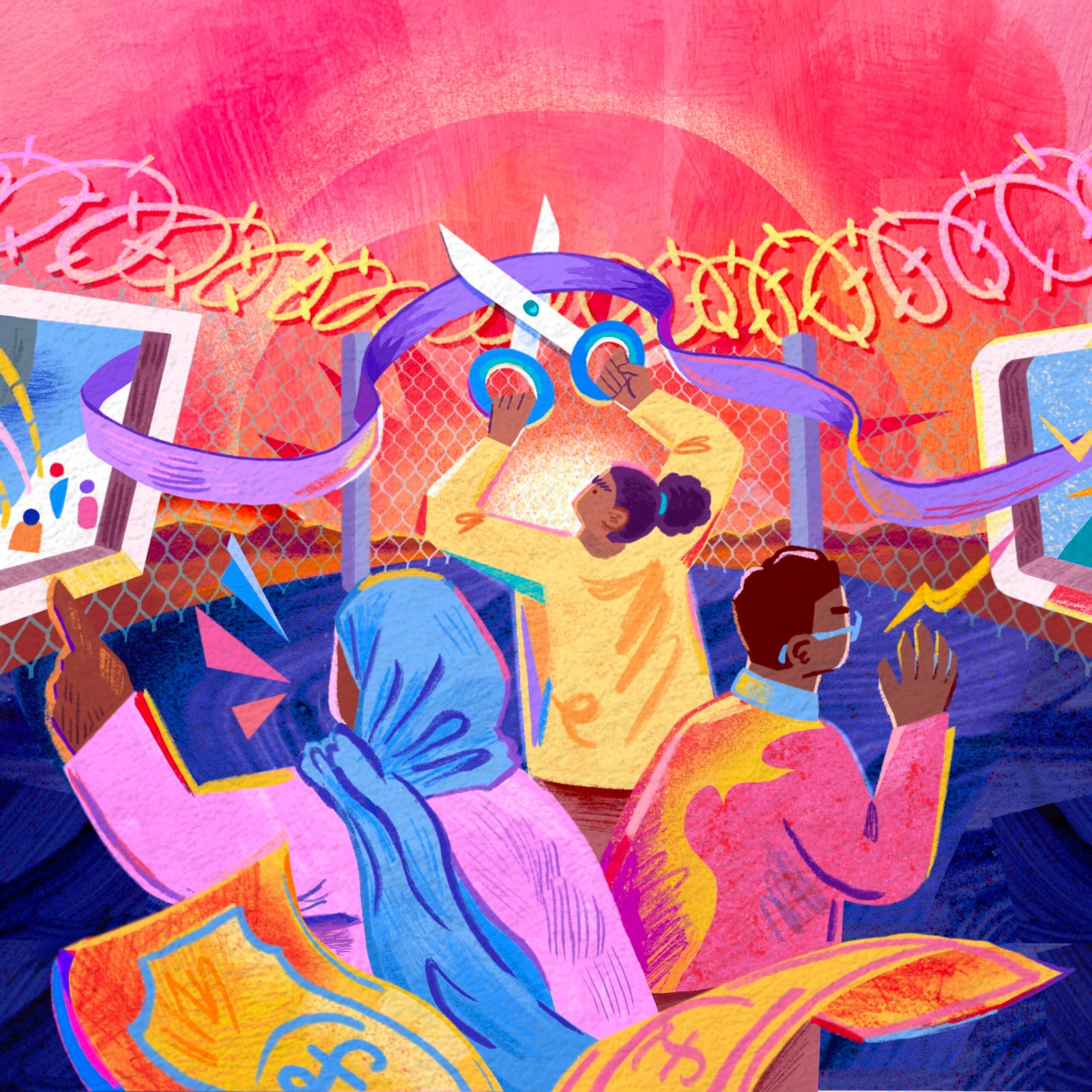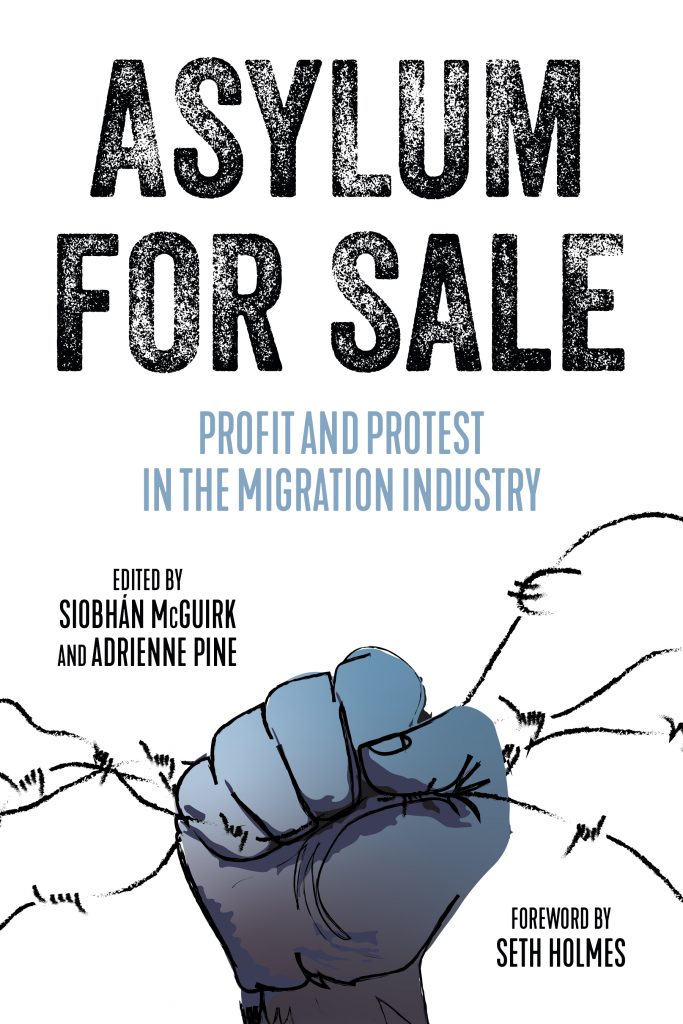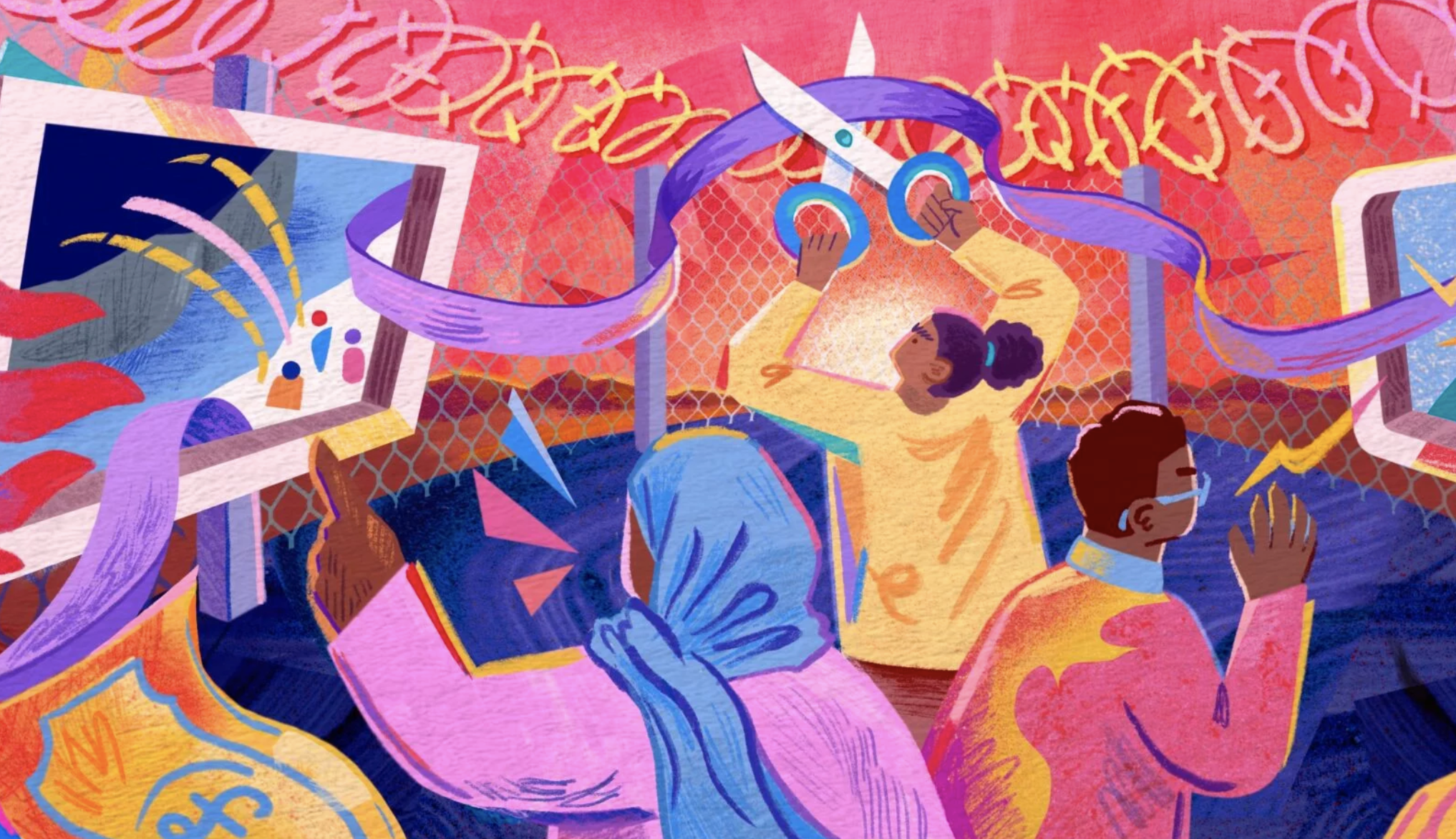By I.K. and Cherie Kwok
Shado Mag
January 4, 2023
In conversation with Siobhán McGuirk on how Neoliberal Capitalism is driving the expansion of the migration industry, and where we could be headed
When you come across a book which Naomi Klein calls “an unparalleled resource”, you know you are in for an experience. Asylum for Sale: Profit and Protest in the Migration Industry, edited by Siobhán McGuirk and Adrienne Pine, exposes how the capitalist profit motive inevitably drives the expansion of the asylum industry, whilst also documenting the exploitative human cost of this regime and providing a chorus of potential answers to how we fight back against it. After having the opportunity to read the volume for myself, I sat down with Siobhán to discuss the makings of the book and how its relevance only continues to grow over time.
Early on in Asylum for Sale and in our own conversation, Siobhán warns that “we all exist in some relation to the migration industry,” whether we’re conscious of it or not. The right to cross borders and the right to claim asylum have both increasingly become commodified, and profit is extracted from people seeking asylum at every stage of the process.
While this might be seen as an uncomfortable truth, it actually provides us with the alternative view that because we all exist in relation to the system at hand, we all hold a certain power and agency in our interactions with that system. Especially in the context of so-called ‘migration crises’, scandal after scandal in offshore detention centres, and so forth – it is important that this agency is remembered, as it dissembles the narrative that all immigrants are simply passive victims to the border regime.
Moreover, since all of the ways we relate to migration, refugees and asylum differ from person to person, so do our individual ways of processing and expressing them. This was one of the central reasons why Siobhán and her co-editor Adrienne were keen on uniting a range of formats for each of the chapters. “We’ve tried to make it accessible by including a variety of essays, infographics, photographs, graphic illustrations, and artworks,” Siobhán explains. As a trained filmmaker and visual anthropologist and as someone who is dyslexic, she adds, “I’ve always felt that there are multiple ways to understand social issues, so why wouldn’t we use all of them at our disposal?”
Artistic and creative methodologies in the immigration justice movement also allow us to anonymise people for their safety and break down language barriers. This commitment to encouraging different forms of expression from contributors of the volume has in turn supported the diversity of voices we hear from in their own words, not massaged and carefully curated narratives to appease neoliberal visions of who is or isn’t a victim of the system (and therefore deserving of care).
Perspectives range from the harrowing accounts of people victimised by organ harvesting schemes in Nancy Scheper-Hughes’ chapter “Kidneys Without Borders – Asylum without Kidneys”, to the photo essay journey of refugees in “The Business of Selling Life: Reflections from a Rescue Ship in the Mediterranean Sea” by Alva, Uyi, and Madi.
In the chapter “From Paris to Lampedusa”, by Louise Tassin, we explore how the French state makes a habit of employing immigrant workers in CRAs (Centre de Retention Administrative /Administrative Detention Centre) with the same class or ethnic backgrounds as the refugees detained there. By creating these intermediaries between the state’s immigration complex and refugees themselves, the French state attempts to pacify and normalise the violence of detention – a pattern of relations which potentially reminds one of colonial intermediaries of times past. Not only are the detainees victimised in a cycle of state violence, but these workers are exploited also– some of whom may have been refugees themselves at one point.
Another example of diverse formatting is the comic-book style firsthand account in the chapter “A Guards Story”, where we see the harrowing and exploitative reality of detention centres in Australia through the eyes of a former employee of Serco who had taken on a role as a “client support worker” (essentially a prison guard). Pathways to solidarity or education with people who work in detention centres have remained relatively unexplored in protest practice and strategy, perhaps because of the assumed attitudes of people who would take on those jobs, or the security restrictions which prevent us from accessing their attention. However, whether they recognise it or not, these workers themselves are being exploited and harmed psychologically by the detention centres they work for, and the chapter urges us to question how we can reach out to and engage with people who work within asylum and migration industries, to try and encourage solidarity action and whistleblowing from their side.
Ultimately, Asylum for Sale serves as a reference point for almost every corner of the discourse around immigration. It’s a book that can be picked up and read from front-to-back, or alternatively you can bounce around selected chapters based on what you specifically want to learn more about. The volume is split into five sections: Crossings, Waiting Games, Complex Industries/Industrial Complexes, ‘Nonprofit’/’Nongovernmental’, and Aftermaths. This structure gifts the reader an immediate insight into how broad the web of profit-making spans across society.
Importantly, it acknowledges the entanglement of lobbying relations between governments, private businesses and nonprofits on a global level. “The veil has been lifted here in the UK about how much corruption there is in the government. I think the COVID contracts brought attention to that,” Siobhán notes. Similar to how big business and government leaders get off lightly even when their scandalous links are exposed, when people have been fired or dismissed for going ‘too far’ over the line with their hate-mongering rhetoric and abusive immigration policies we see a familiar story. Politics is a revolving door: the system is broken and it’s not just a few rotten apples.
It will be interesting to see the next moves of former Home Secretary Priti Patel and other political figures who have been involved in the Rwanda Plan and other anti-immigration strategies, and most importantly who they lend advice to while they still have the capacity to influence. Although they may not be sitting on the benches of parliament any longer, many still have the ear of those in power.
We are also seeing the entanglement of the past, present and future in relation to UK politics and immigration policy. Take Serco for example – a multinational corporation that holds many contracts for immigration detention centre management and deportations. Siobhán notes that the corporation’s CEO is Rupert Soames – the brother of former Conservative Party MP and now member of the House of Lords Nicolas Soames, and perhaps more shockingly, the grandson of Winston Churchill.
One can’t help but acknowledge the parallels between the Serco CEO’s profiteering off the expansion of the asylum industry, and how Churchill built his own career off of the brutalisation of colonised and minoritised peoples. “We have to keep reminding people that it shouldn’t be like this that some very wealthy and influential people make huge profits from border walls, surveillance systems, detention centres, deportation flights, and other subcontracted ‘services’. Corporate shareholders have vested interests in policies that increase human suffering,” Siobhán warns.
When I ask her what she thinks has changed since Asylum for Sale was initially released in March 2020, Siobhán reveals that she was initially worried that it would lose relevance by the time it got onto bookshelves. Instead, she explains, “the painful realisation has been that Asylum for Sale has only become more relevant and useful in helping people analyse what is happening around migration.”
Siobhán also notes that the language used in mainstream media narratives and by politicians has changed for the worse over the last few years.” During the 2015/16 era of the so-called ‘refugee crises’ and Trump’s unrelenting xenophobic talking points and policies, a number of outlets including Al Jazeera and the New York Times made clear statements about not labelling refugees as “economic migrants.” Now, even the BBC has picked up on the UK government’s language of labelling asylum seekers and refugees as “migrants” who arrive “illegally”. Siobhán emphases this is a hugely irresponsible and inaccurate representation of people’s rights to movement and of the UK’s legal duty to consider asylum claims.
Contrary to these misrepresentations of international law, there is nothing illegal about seeking and applying for asylum once you have made a crossing – whether it is by boat or by private plane. Putting people in unsanitary, dehumanising circumstances resembling criminal incarceration is not necessary nor required by law to enable the processing of asylum claims. What is often being criminalised is not migration in and of itself, but the migration specifically of people deemed too “poor” to be granted visas, which are tightly restricted by the UK government. Formal migration systems favour the rich. There is no visa that allows people to enter the UK in order to seek asylum.
Deconstructing the language and popular symbolic representations of immigrants as illegal is therefore a critical part of the struggle against oppressive policies. Language creates possibility in positive and negative ways. As both an organiser supporting people in immigration detention and the granddaughter of Japanese relatives interned in Internment Camps during World War Two by the American Government, I know this reality all too well. As a society, the beliefs we hold and language we use around immigration and immigrant communities have a direct impact on what policies have the possibility of passing through parliament or other legislatures, which can become dogwhistles to the far-right and embolden the proliferation of hate crimes and terrorist attacks against immigrants and perceived ‘others.’
For all of these reasons, Asylum for Sale is a welcome, creative, and encyclopaedic addition to existing analysis and narratives on the global asylum industry. It inspires us to bring in an economic lens to the way we view the expanded militarisation and commodification of immigration systems, as a result of neoliberal capitalism’s dependence on the exploitation of vulnerable, marginalised people for profit-making practices. Siobhán hopes the book will inspire further research into the asylum industry’s dynamics, particularly in the Global South, home to the vast majority of forcibly displaced people in the world.
Moreover, the volume points to the need for more writings and organising grounded in explicitly abolitionist perspectives and ideologies, recognising the intersections between the prison industrial complex and asylum industry. Ultimately, Asylum for Sale serves as a useful tool for a broad range of people, whether they recognise themselves as journalists, academics, activists, creatives, or anything in between.
What can you do?
- Read Asylum for Sale here! Siobhán and her co-editor Adrienne have made a point of making the book as affordable as possible. It is published by the independent, anarchist PM Press, with a very affordable e-Book version, and pay what you can afford price – use the code ASYLUM40 or ASYLUM20 for 40 percent or 20 percent off. You can read the introduction for free here
- Learn more about UK migrant justice work through the Solidarity Knows No Borders Network, a community of migrant organisations, groups and individuals, working in solidarity, to end hostility and racism against migrants and refugees. You can sign their Fair Immigration Movement (FIRM) Charter here to show your solidarity, join their regular organising meetings at local and national levels, and explore their resources too.
- Learn how language impacts people’s lives and take the “Words Matter” Pledge at Migrants Rights Network
- Donate to the LGSM Winter 2022 Fundraiser. Lesbians and Gays Support the Migrants – a queer abolitionist group standing in solidarity with all migrants, through fundraising and direct action – is raising funds for the Queer Nigerian Emergency Fund by the Oasis Project, and the Solidarity Appeal for Flood Victims in Pakistan by the Women Democratic Front.
- Join a local anti-raids network near you! Anti Raids Network are a loose network of local groups resisting immigration raids across the UK.
- Watch Flee, the 2021 adult animated documentary film: a moving, true story of a gay Afghan refugee, Amin and how he navigates identity, belonging, and various traumas while escaping persecution.
- Explore more of Siobhán’s work here – with all of her various works involving film, journalism, publications, art and curation, there is a lot to see and learn from!
- Hear global perspectives on the asylum industry in Asylum for Sale: Capitalism Migration and New Refugee Regimes
- Listen to Siobhán discuss how UK companies profit from violent border and migration policies on the Mandatory Redistribution and Left/Over podcasts.
- Watch Siobhán discuss the UK hostile environment and the history of violent border regimes with Leah Cowan, author of the excellent book Border Nation, at this talk filmed at the Edinburgh Radical Book Fair

Check out Adrienne Pine and Siobhán McGuirk’s & new book:







